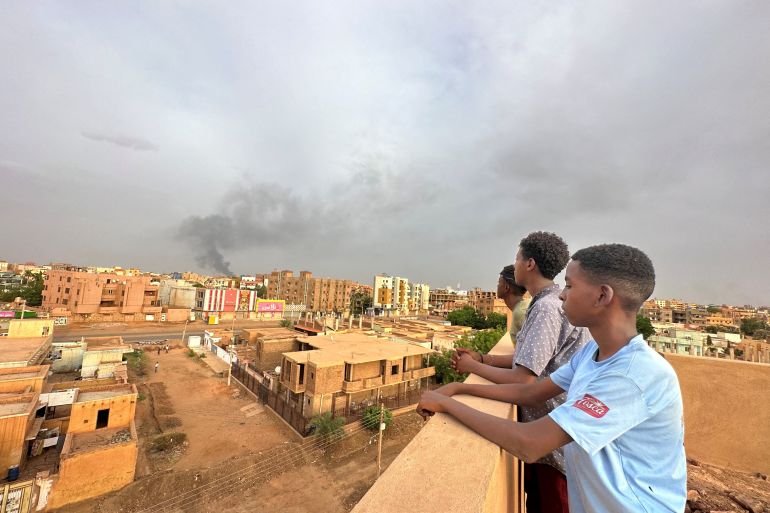More Sudanese flee the fighting, UK sanctions warring factions
The sanctions target three businesses linked with the army and three others tied to the RSF.

The United Kingdom has imposed sanctions on a number of entities linked with the warring factions in Sudan as more people are uprooted by the country’s conflict of nearly three months.
The British government on Wednesday announced sanctions on three businesses linked with the Sudanese Armed Forces (SAF) and three with the paramilitary Rapid Support Forces (RSF) in a stated effort to pressure warring parties to engage in a peace process and facilitate humanitarian aid.
Keep reading
list of 4 itemsWhat does Sudan’s crisis mean for the gum arabic industry?
UN warns of ‘full-scale civil war’ in Sudan, Egypt to host summit
Air raid kills at least 22 in Sudan’s city of Omdurman
The Defence Industries Systems (DIS) and two other entities were blacklisted for bankrolling and providing support to the army and its chief commander, General Abdel Fattah al-Burhan.
The UK said the conglomerate finances the general and has more than 200 companies and makes an annual profit of $2bn.
For financing and arming the RSF, the UK sanctioned Al-Junaid, a conglomerate said to be set up by the paramilitary force’s leader, General Mohamed Hamdan “Hemedti” Dagalo, along with two other companies.
“These sanctions are directly targeting those whose actions have destroyed the lives of millions. Both sides have committed multiple ceasefire violations in a war, which is completely unjustified,” Foreign Secretary James Cleverly said in a statement.
“Innocent civilians continue to face the devastating effects of the hostilities, and we simply cannot afford to sit by and watch as money from these companies, all funding the RSF or SAF, is spent on a senseless conflict.”
The United States had also imposed its first sanctions related to the war in Sudan in early June, blacklisting two firms associated with the SAF and two others linked with the RSF.
Tensions between the two sides exploded into an all-out war in mid-April and have only grown in scale and intensity since, leaving thousands dead and many more injured.
Numerous ceasefires agreed in Jeddah have been violated, with mediators Saudi Arabia and the US electing to suspend the talks last month.
The army-aligned Sudanese foreign ministry on Tuesday rejected a proposal by the East African regional body, the Intergovernmental Authority on Development (IGAD), for a regional summit and deployment of a regional peacekeeping force.
The Sudanese foreign ministry has, however, welcomed an upcoming summit hosted by Egypt – which is widely seen as closer to the army than the RSF – to be held later this week.
Meanwhile, fighting continues to rage across the war-torn country, especially in the Darfur region to the west, where ethnic violence continues to claim the lives of many African Masalit community members who are attacked by RSF-backed Arab tribes.
The latest estimates from the International Organization for Migration (IOM) on Tuesday said the number of people uprooted by the conflict has now surpassed three million.
The UN-backed organisation said more than 2.4 million people have been displaced internally and more than 730,000 have crossed into neighbouring countries.
The capital, Khartoum, much of which has been abandoned or destroyed during the fighting, and Darfur have seen most people flee, according to the IOM.